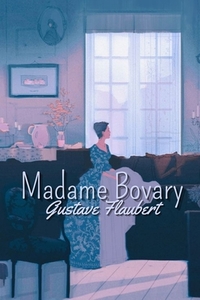Take a photo of a barcode or cover
challenging
informative
reflective
relaxing
sad
tense
medium-paced
Plot or Character Driven:
Character
Strong character development:
Complicated
Loveable characters:
Yes
Diverse cast of characters:
No
Flaws of characters a main focus:
Yes
slow-paced
Plot or Character Driven:
Character
Strong character development:
No
Loveable characters:
No
Diverse cast of characters:
No
Flaws of characters a main focus:
Yes
challenging
reflective
sad
slow-paced
Plot or Character Driven:
Character
Strong character development:
No
Loveable characters:
Complicated
Diverse cast of characters:
N/A
Flaws of characters a main focus:
Yes
Graphic: Infidelity, Suicide
medium-paced
Simplement parfait (-0.5 pour les persos insupportables, particulièrement dans la dernière partie du livre)
This is a beautiful translation, so kudos to Margaret Mauldon.
The reason this book doesn't merit 5 stars for me is mostly a personal aversion to the insufferable character of Madame Bovary. Contrary to the ideas I had of her predicament and nature entering this novel (which were admittedly very few; and mostly concerned the idea that she was an unfortunate woman, constrained into a life and marriage she didn't want, and presumably due to some heroic or similar characterisation or ambition, wanted out of it), she is one of the most manipulative, overdramatic and generally frustrating characters I have ever encountered in a novel. The reasons for her aversion to her husband - who, in my eyes, did everything he could possibly do for Emma, taking into account the fact that she never actually told him what she wanted, which surely put him at a loss anyway - were pitiful, and the more I read this book, the less sympathy I felt for her. And the male characters of Leon and Charles, (though not Rodolphe, of course; he was unbearable as well), although they did appear comparatively - and unsurprisingly, given the extent of Emma's nature - less spirited, actually garnered my sympathy, struggling to understand and help this endlessly exhausting woman. The ending was highly depressing, and definitely one of the saddest conclusions I've read in a book for a long time.
Would I recommend this? Yes; the writing is fluent, descriptive and evocative, and the scenes memorable. It also has quite a grounding in the current cultural context of France at the time, which I found interesting. If you can bear to see through the scarily controlling eyes of a woman who pretty much brings about her own downfall and blames it on everyone else, for long enough, then this is a good and memorable choice from the literary canon. I'm just not sure that the message everyone plasters over this novel nowadays as a woman 'taking charge' as she's unhappy in her life/marriage, is really what this story seems to be about. If anything, its moral - to me, at least - is to stop having a preference for earthly, material things
The reason this book doesn't merit 5 stars for me is mostly a personal aversion to the insufferable character of Madame Bovary. Contrary to the ideas I had of her predicament and nature entering this novel (which were admittedly very few; and mostly concerned the idea that she was an unfortunate woman, constrained into a life and marriage she didn't want, and presumably due to some heroic or similar characterisation or ambition, wanted out of it), she is one of the most manipulative, overdramatic and generally frustrating characters I have ever encountered in a novel. The reasons for her aversion to her husband - who, in my eyes, did everything he could possibly do for Emma, taking into account the fact that she never actually told him what she wanted, which surely put him at a loss anyway - were pitiful, and the more I read this book, the less sympathy I felt for her. And the male characters of Leon and Charles, (though not Rodolphe, of course; he was unbearable as well), although they did appear comparatively - and unsurprisingly, given the extent of Emma's nature - less spirited, actually garnered my sympathy, struggling to understand and help this endlessly exhausting woman. The ending was highly depressing, and definitely one of the saddest conclusions I've read in a book for a long time.
Would I recommend this? Yes; the writing is fluent, descriptive and evocative, and the scenes memorable. It also has quite a grounding in the current cultural context of France at the time, which I found interesting. If you can bear to see through the scarily controlling eyes of a woman who pretty much brings about her own downfall and blames it on everyone else, for long enough, then this is a good and memorable choice from the literary canon. I'm just not sure that the message everyone plasters over this novel nowadays as a woman 'taking charge' as she's unhappy in her life/marriage, is really what this story seems to be about. If anything, its moral - to me, at least - is to stop having a preference for earthly, material things
Spoiler
exemplified by the creepy blind beggar whose face appears to Emma just before she dies: as if to say, seeing and wanting only empirical things led to her downfall, and she was blind to this, and is now blind too, because of it, forever.
Don't be a literate woman trapped in 19th Century France. Things will not go well for you.
emotional
sad
tense
slow-paced
Plot or Character Driven:
Plot
Strong character development:
No
Loveable characters:
Complicated
Diverse cast of characters:
No
Flaws of characters a main focus:
Yes



